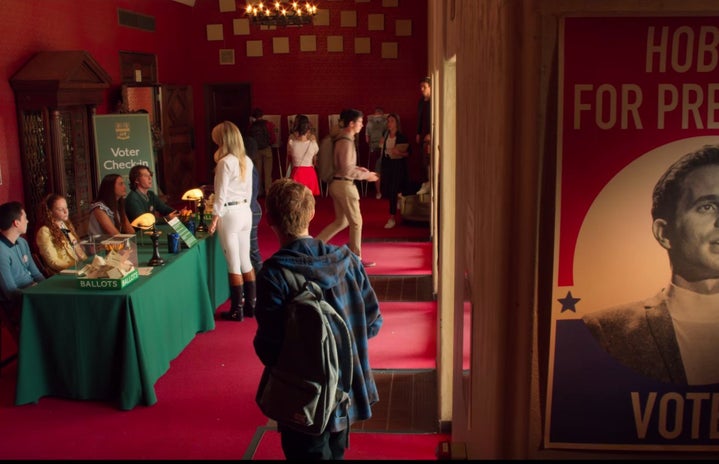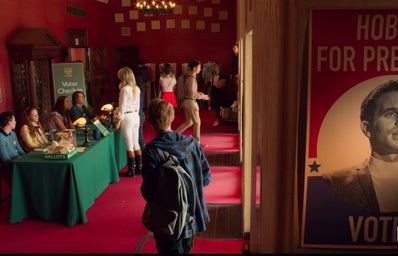Warning: this article contains spoilers.
In America’s current political climate, any TV show called “The Politician” is going to turn heads, especially if said show is created by the brilliant Ryan Murphy of Glee and American Horror Story. Not to mention a high-profile cast consisting of Broadway star Ben Platt as the lead, up-and-comers Zoey Deutch, Lucy Boynton, and David Corenswet in supporting roles, along with legends Jessica Lange and Gwyneth Paltrow. While satirizing the intensity and absurdity of modern politics, The Politician also manages to address key issues such as mental health, sexuality, disability, gender, suicide, race (and the list goes on). While many of these issues can often feel forced and the plot itself can be aggressive and jumbled, it cannot be denied that The Politician is an entertaining modern work of art that showcases impressive cinematography, a killer soundtrack, and an awareness of relevant societal issues from which we can all learn.
The show follows Payton Hobart (Platt), a wealthy and ambitious teenager desperate to win his high school presidential election as the first stepping stone on his way to becoming President of the United States. Payton has mastered the smooth-talking navigation of political issues and even has his future first lady picked out: his girlfriend Alice. However, his running-mate, the popular, intoxicating River Barkley (Corenswet) further complicates the situation when it is revealed when that River and Payton had an affair. River’s appeal is most apparent in the first school debate, during which he reveals his struggle with depression and a previous suicide attempt. River’s authenticity elicits relatability and sympathy in the audience in a way that Payton’s perfectly-curated, politically correct debate responses never could. This debate initiates a long, melodramatic series of events that ultimately leads up to the election itself.
The entire show is really driven by the remarkable talent of Ben Platt, an emerging star after his Tony awarding winning Broadway performance in Dear Evan Hansen and his recent album release. His magnitude and raw talent is suited perfectly for his character, Payton, and the few musical numbers sparsed throughout the show showcases his musical abilities and commanding presence on the stage. While these musical numbers are incredibly executed, they feel very random and forced in the context of the plot (but did we really expect Ryan Murphy to cast Ben Platt without a few musical performances?). Payton’s “political team,” consisting of his girlfriend Alice and friends McAfee and James, mirror his intensity and political attitude, doing everything they can to ensure victory. This includes encouraging Payton to choose cancer stricken classmate Infinity Jackon (Deutch) as his running mate to gain the sympathy vote.They soon learn, however, that Infinity is a victim of Munchausen by Proxy, a psychological disorder in which a caregiver (in this case Infinity’s Nana, played by Jessica Lange), seeks medical help for exaggerated or medical symptoms for a child in their care. Basically, Infinity’s over-the-top, attention seeking Nana pretends she has cancer and gives her chemotherapy to make her appear sick, all so that she can receive the monetary benefits of having a sick child (i.e. vacations, prize money, etc.). This secondary plot line provides a significant distraction from the main conflict, and too closely resembles the famous case of Gypsy Rose Blanchard, which was recently dramatized in Hulu’s The Act. While Lange’s performance is true to style and Deutch fulfilled her role well (which was a departure from her typical roles as an actress), the whole storyline was unnecessary and took away from the many other important aspects of plot the story includes.
Despite the key conceptual downfalls, overall, The Politician was enjoyable to watch, and I found myself watching the episodes continuously to the point where Netflix had to ask: “Are you still watching The Politician?” The show is excessively dramatic, and a bit of a mess, but that is what makes it fun to watch. It also has many layers of meaning beneath the satirical surface, alluding to the dramatized and divided nature of American politics, and the use of “horse race journalism” in many political races. Payton’s battle with his sexuality relates to what many teens battle with in their formative years. The divisions of the wealthy California town in which the show takes place demonstrates socioeconomic disparity and the issues that many of the citizens on “the other side of town” face daily. Additionally, the show’s cast represents a diverse variety of races, physical and mental abilities, and sexual and gender identities that promote a level of inclusivity Hollywood needs more of. The Politician definitely isn’t the best show you’ll watch this year, but it’s definitely worth a try, if only to indulge in the jaw-dropping drama and/or to get Ryan’s Murphy’s take on many of the prevalent issues plaguing modern American society.


